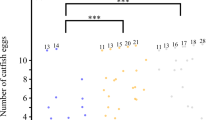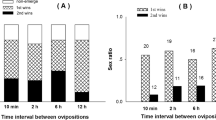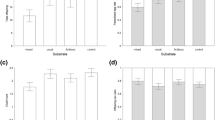Abstract
THE female of the parasitic wasp Pseudeucoila bochei (Hymenoptera : Cynipidae) lays her eggs in larvae of different Drosophila species, and only one parasite emerges from each host. The parasite is able to discriminate between parasitised and unparasitised host larvae1, but this ability does not completely prevent super-parasitisation. On investigating the probable causes of super-parasitisation, we discovered that the female wasp has to learn to discriminate, learning being that process which manifests itself by adaptive changes in individual behaviour as a result of experience2.
This is a preview of subscription content, access via your institution
Access options
Subscribe to this journal
Receive 51 print issues and online access
$199.00 per year
only $3.90 per issue
Buy this article
- Purchase on Springer Link
- Instant access to full article PDF
Prices may be subject to local taxes which are calculated during checkout
Similar content being viewed by others
References
Bakker, K., Eijsackers, H. J. P., van Lenteren, J. C., and Meelis, E., Oecologia (Berl.), 10, 29–57 (1972).
Thorpe, W. H., Learning and Instinct in Animals (Methuen, London, 1956).
Author information
Authors and Affiliations
Rights and permissions
About this article
Cite this article
VAN LENTEREN, J., BAKKER, K. Discrimination between parasitised and unparasitised hosts in the parasitic wasp Pseudeucoila bochei: a matter of learning. Nature 254, 417–419 (1975). https://doi.org/10.1038/254417a0
Received:
Issue Date:
DOI: https://doi.org/10.1038/254417a0
Comments
By submitting a comment you agree to abide by our Terms and Community Guidelines. If you find something abusive or that does not comply with our terms or guidelines please flag it as inappropriate.



